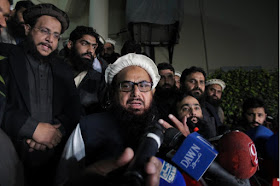[On Monday, Chaudhry Nisar Ali Khan, the Pakistani interior minister, announced that action against Jamaat-ud-Dawa was being discussed and that a decision would be announced on Tuesday. Hours later, police officers arrived at the group’s headquarters in Lahore and placed Mr. Saeed under house arrest. Party banners and flags were removed from the offices.]
By Salman Masood
 |
|
Hafiz
Muhammad Saeed, chief of the banned Islamic charity Jamat-ud-Dawa, on Monday as
he was escorted to his home where
he would be under house arrest in Lahore, Pakistan.
Credit Reuters
|
ISLAMABAD,
Pakistan — After years of
living in the open in Pakistan despite a $10 million American bounty, the
militant leader accused of orchestrating the 2008 Mumbai attacks, Hafiz
Muhammad Saeed, was placed under house arrest in Lahore on Monday, Pakistani
officials said.
The move against Mr. Saeed, the founder of
the banned militant group Lashkar-e-Taiba, came amid a reported new round of
pressure by the United States to arrest Mr. Saeed and to ban Jamaat-ud-Dawa,
the charity he leads, which has been accused by American officials of being a
front for militants. The News, a Pakistani English-language newspaper, reported
on Monday that American officials in the waning days of the Obama
administration had threatened sanctions or other penalties if action was not
taken.
On Monday, Chaudhry Nisar Ali Khan, the
Pakistani interior minister, announced that action against Jamaat-ud-Dawa was
being discussed and that a decision would be announced on Tuesday. Hours later,
police officers arrived at the group’s headquarters in Lahore and placed Mr.
Saeed under house arrest. Party banners and flags were removed from the
offices.
This is not the first time, however, that Mr.
Saeed has been put under house arrest, and he has repeatedly avoided long-term
detention or serious legal charges. He was placed under detention at least
twice after the 2008 attacks in Mumbai, which killed at least 166 people. India
claimed almost immediately then that Mr. Saeed was the mastermind of the
terrorist attacks.
A Pakistani antiterrorism court is currently
trying six suspects in the case: Mazhar Iqbal, Hammad Amin Sadiq, Abdul Wajid,
Shahid Jameel Riaz, Jamil Ahmed and Younus Anjum. Another important suspect,
Zakiur Rehman Lakhvi, considered the operational head of Lashkar-e-Taiba, is
out on bail.
For years, the Pakistani military
establishment used Lashkar-e-Taiba and other militant groups as proxy forces
against India in Kashmir.
In 2012, the American authorities announced a
$10 million reward for information leading to the arrest and conviction of Mr.
Saeed. But he has continued to make public appearances, at times openly mocking
the United States for his apparent impunity, and the issue has been a source of
strain between the United States and Pakistan. Pakistani officials have balked
at American and Indian pressure to charge Mr. Saeed in the Mumbai attacks,
saying there is not enough evidence to prosecute him.
More recently, as border tensions have
mounted with India again in recent months, Mr. Saeed has been at the forefront
of large protests against the Indian military.
This month, Mr. Saeed asked the Islamabad
High Court to remove his name from a terrorism watch list and maintained that
he had no links to Lashkar-e-Taiba.
Jamaat-ud-Dawa, meanwhile, has spread across
the country from its initial base in Punjab Province. Over the past decade, the
group has provided aid to those hit by natural disasters, and in some areas
where the government has failed to provide basic necessities, Jamaat-ud-Dawa
has worked to fill the void.
Accordingly, Mr. Saeed has sympathizers and
supporters across a large spectrum of society, and Pakistani officials have
been wary of a potentially violent backlash if they move against the militant
leader.